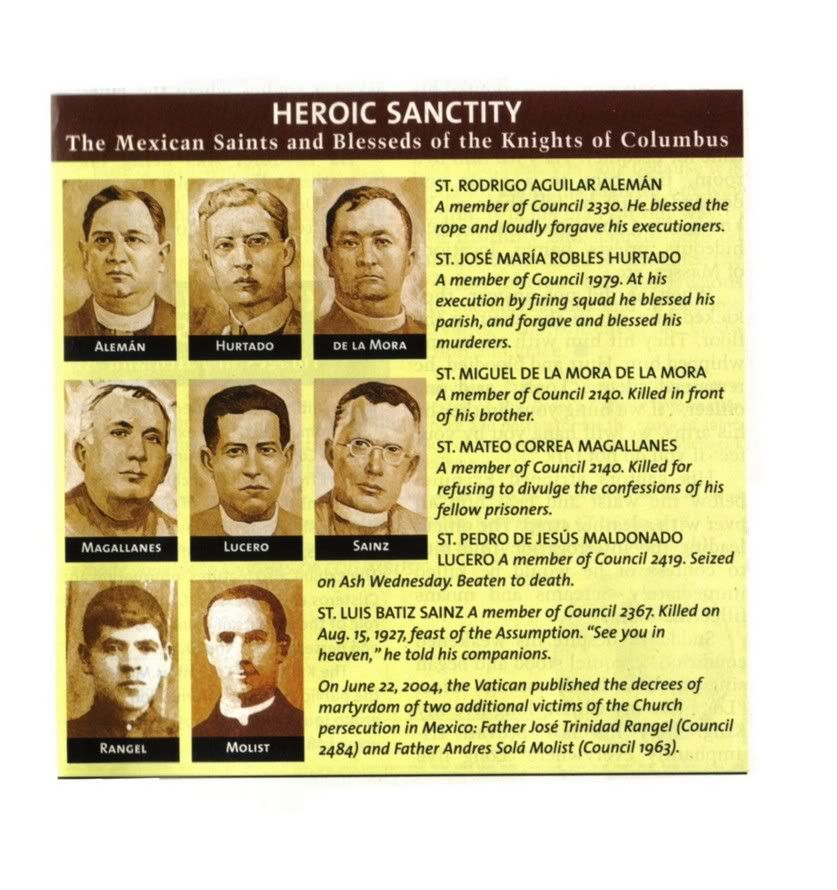| The three men were taken to a military post for questioning. An officer asked them their names, trying to find out which one was a Huerta brother. Ezequiel identified himself immediately. The two young men told the police that they had been at Huerta’s house for singing lessons when they were apprehended. The officer ordered Ezequiel to be put in one cell and the young men in another cell. From his cell, Ezequiel gave encouragement to the young men. He told them to pray and leave everything in God’s hands. He himself meditated on the accounts of the many Cristeros who had been beaten, massacred and executed for the faith. He prayed for his priest brothers and for his other family members. At times, he broke the silence with whisperings of prayer: “Thank you, my Lord.” At approximately 9 p.m. the soldiers returned. They stopped in front of Ezequiel’s cell, opened the door and threw something — someone — inside. Moans began to rise from the person who had just been dumped in the cell. “Who is that man, Mr. Ezequiel?” asked the young man Bernal. “I do not know,” he replied. Darkness surrounded the prisoners. Guided by the moaning, Ezequiel approached his new cellmate. He turned the body over and saw the hardly recognizable bruised and bloody face of his brother Salvador. His feet were bare and bloody. “Salvador, Salvador,” Ezequiel whispered. “Can you hear me?” His brother squeezed his hand and said, “What are you doing here, Ezequiel? They grabbed you, too? I give thanks to God that you are here, my brother.” Salvador continued: “We must be strong because we do not know what awaits us. Brother, no matter what happens, we must continue until the end. If the hour has come and we have to give up our lives, it does not matter. We must endure. Now it is time to defend what is ours — our liberty and our country.” Ezequiel took off his shirt and softly passed it over his brother’s bloody face and feet. Fernando Calderas, one of the young men who had been arrested with Ezequiel, was especially friendly with Salvador. “What happened to you?” he asked from his own cell. With broken words and between sobs of pain, Salvador recounted his interrogation and the charges brought against him for being a traitor to the country. The police asked him about his priest brothers and the whereabouts of the Cristeros. They tried to make Salvador talk by slapping him, hitting him with a stick and burning him. They tied his hands to a ceiling beam and hit him hard all over his body until he bled. His tormentors tried everything they could to get him to talk, but they only heard Salvador’s unhurried praying of the Our Father in response. After Salvador had recounted his torture to his brother and the two young men, the police returned, this time for Ezequiel. They led him to a room, tied him to a chair and demanded that he tell them all he knew about the Cristeros — their hideouts, priests’ names, locations of Masses, etc. When he did not answer, they kicked him out of the chair to the floor. They hit him with sticks and whipped him. Hurt and bloodied, he remained silent. “Look,” said one officer, “if we hung your brother by his arms, we will hang you by your feet if you do not talk.” His captors stripped Ezequiel below the waist and beat him all over with a leather strap. The officer leading the interrogation told him to confess or he would be killed immediately. Screams and moans filled the room. Suddenly, despite his weakened condition, Ezequiel stood and began singing in a loud, strong voice: “Long live my Christ, long live my King! May his law prevail triumphantly everywhere! Long live Christ the King! Long live Christ the King!” Time and again he sang the Cristeros hymn and time and again he was whipped and beaten. It was reported that his singing could be heard throughout most of the police station. Ezequiel was returned to his cell, where he reported to Salvador and the young men what had happened to him. “Were they able to get any information out of you?” Salvador asked. “Brother,” Ezequiel replied, “they will obtain the information only in paradise…if they ever get there.”
|



